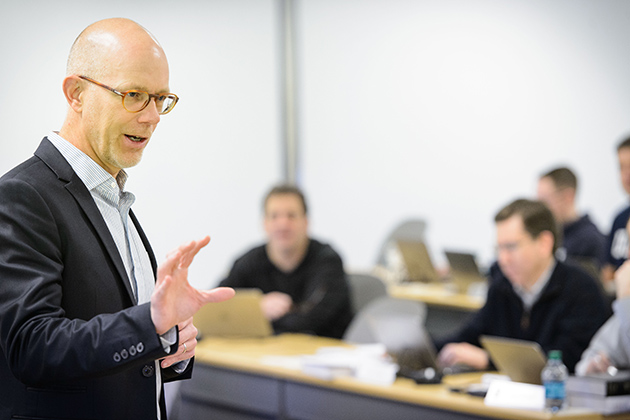
Scanning the covers of business magazines and surfing the Internet for new business trends will result in dozens of stories about how an entrepreneur took an idea, developed it, and launched a successful business. From the start, entrepreneurs make decisions that will affect how they will be able to turn their idea into a successful enterprise and build a successful business.
“Entrepreneurs have a lot of biases that might warp their impression of an opportunity,” says Timothy B. Folta, professor of management and Thomas John and Bette Wolff Chair in Strategic Entrepreneurship in the School of Business. “That’s one of the reasons entrepreneurs are interesting. From an educational perspective one of the purposes of getting training in entrepreneurship is to protect against these biases. Being aware of them is half the battle.”
Folta arrived in Storrs earlier this year after 15 years on the faculty at Purdue University’s Krannert Graduate School of Management, where his research and teaching focused on both entrepreneurship corporate strategy and how managers and entrepreneurs use organizational design to cope with uncertainty. In addition to how decisions are made to launch a new venture, he also studies when and why entrepreneurs decide to leave their business.
A prolific author, Folta’s writing has appeared in a variety of refereed journals and has been recognized with awards from the Academy of Management and the U.S. Small Business Administration. He has been invited to present papers at universities in the United States and Europe, and received the 2009-2010 Fulbright Special Award for the 60th Anniversary of the Fulbright Program in Italy, among other honors. He serves on the editorial boards for the Strategic Management Journal, Strategic Entrepreneurship Journal, Strategy Science, and Journal of Business Venturing.
Folta says one of the major pitfalls he cautions entrepreneurs against is extreme optimism about their ideas, preferring a measured approach that still retains enthusiasm for their ideas.
“Passion matters a lot. I think passion is a byproduct of over-optimism, or at least optimism,” Folta says. “Passion can be blinding, but at the same time there is an endogeneity with passion. If you’re passionate, you can infuse that passion in the people you work with, potential investors, and other stakeholders. That’s probably an impression we have of successful entrepreneurs, but as academics we have to walk this fine line between being overly passionate. You try not to let the passion bias your decision making. You want to compartmentalize your passion. You don’t want to make decisions with passion; they should be made objectively, but interactions with people should be passionate.”
Seeking collaboration
Even as he studies how entrepreneurs plan and develop strategies, Folta explores new areas for his research – particularly collaborative, interdisciplinary efforts. While at Purdue he served as director of BIOMEDSHIP, a program designed to study and provide leadership in biomedical entrepreneurship and innovation, which provided an opportunity to jointly teach a class on medical device entrepreneurship with the head of the School of Biomedical Engineering.
“One of the reasons I came [to UConn] was to tap into the interdisciplinary opportunities to teach entrepreneurship,” he says. “I do work in corporate strategy and entrepreneurship, but I’m reaching out to a few areas of campus to see what opportunities exist. Constraining entrepreneurship to the business school is the wrong thing to do, because ideas exist everywhere. Engineering and the sciences are frequently where the high potential ideas come from. I’m trying to reach out there.”
Two emerging areas for potential examination in entrepreneurial studies that Folta sees are in “value creation” and in better understanding organizational growth and opportunities for growth.
He says the long-established idea of maximizing shareholder wealth as the single driving force in an organization is being challenged by an emerging trend toward “social entrepreneurship,” or corporate social responsibility concerns, as well.
“We’re having a hard time grasping that in our current perspective of maximizing shareholder wealth,” Folta says. “It’s an important issue. We have to understand why this trend is emerging, because it’s an important trend, and what’s at play here. It doesn’t fit the typical mold of maximizing wealth.”
At the same time, he says, there needs to be a better understanding of trends in organizational growth. Traditional growth is based primarily on the capabilities of an organization. Today, entrepreneurial opportunities may emerge outside of a business’s capabilities but can be leveraged to generate new capabilities.


